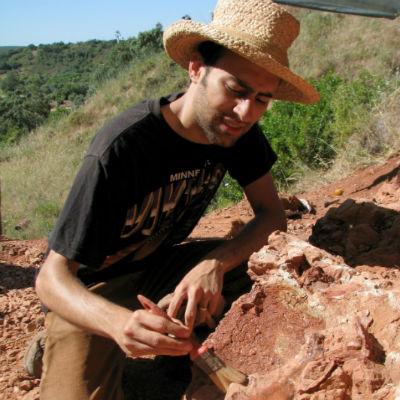Science Festival interview with Dr Steve Brusatte
Dr Steve Brusatte, Chancellor's Fellow in Vertebrate Palaeontology in the University of Edinburgh’s School of Geosciences, took part in several events at the 2015 Edinburgh International Science Festival.
He gave a talk, entitled Dinosaurs and the Making of the Modern World, at 1pm on Sunday 5 April at the National Museum of Scotland.

What can people coming along to your event expect to see and hear?
I'm going to show people how dinosaurs are relevant - not in the sense of why they're important to study, but in how they have shaped our modern world.
T. rex and Triceratops may have gone extinct 66 million years ago, but without them, our modern world would be very different, and we wouldn't be here.
What do you hope audiences can get out of coming along to the Science Festival?
This is one of the largest science festivals in the world, and there's something for everybody. It's flabbergasting in its number of talks, demonstrations and performances.
I can't wait to get up and talk dinosaurs - to show why dinosaurs are relevant, but also to talk about the work we're doing in my lab and to give a sneak peek at some new discoveries.
Why is taking part in the Science Festival important to you?
We live in a challenging time, on a planet that is changing rapidly. We need to better understand our world and how it works, and science is the vehicle for that.
The Science Festival is a celebration of science and discovery. It is a way for us, as scientists, to show the public not only how important scientific research is, but also how much fun it can be.
The kids in the audience will be the innovators of tomorrow. Hopefully our passion for science will rub off on them.
What impact does your day-to-day work have on society?
Unfortunately, those of us who study fossils are sometimes seen as dilettantes - so far removed from everyday life, studying million-year-old bones in our labs without any connection to the real world.
Studying fossils probably won't cure cancer, that's true, but fossils are our only information on how life has changed over time.
Only through fossils can we understand how real animals, plants, and environments responded to environmental shifts, drifting continents, and asteroid impacts.
If we want to understand how our own world is changing, and want to better prepare for these changes and hopefully mitigate them, then fossils are the key.
How does your work with non-scientists affect how you carry out your day-to-day role?
I spend a lot of my time with non-scientists. The days where I'm secluded in my lab for hours are really rare. I work with a lot of great support staff.
I work often with the media and really enjoyed my time as resident palaeontologist for the BBC's Walking With Dinosaurs programme, which allowed me to consult on all sorts of fun projects, including the 3D blockbuster film.
Science is a lot of fun, and I love working with others to enable it, communicate it and put it into context.
What do you get out of engaging with the public?
I really enjoy communicating science to the public, especially engaging with children. I think it’s fun. Science is cool, but it's also important: there are so many challenges facing our world today, and only through new research, new discoveries, and new experiments can we solve them.
People, especially children, love dinosaurs. They're a great way to get people enthralled with nature and thinking about the big questions of science.

